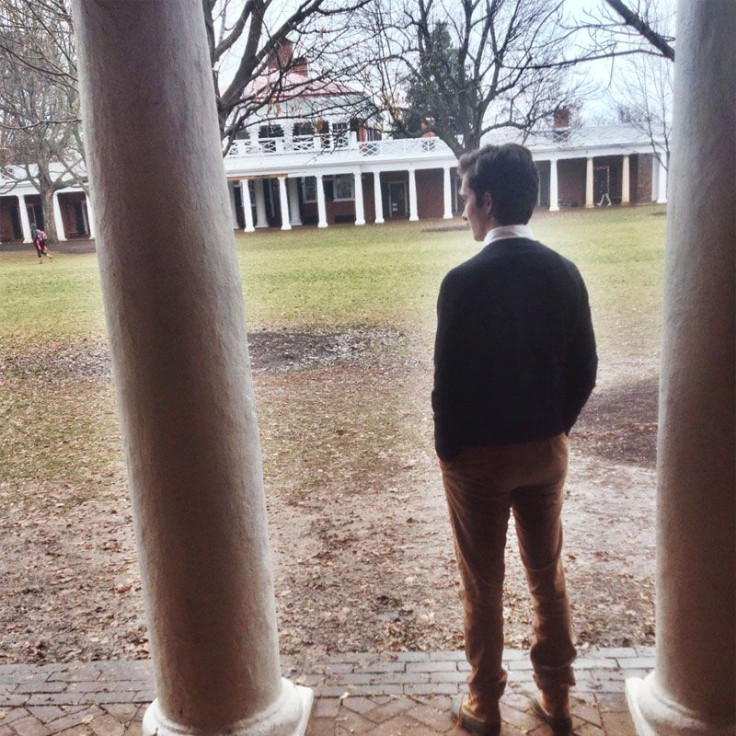Life After Rolling Stone: UVA Students See 'Jackie' As Opportunity To Reform Sexist Greek System

To read the headlines, the collapse of Sabrina Rubin Erdely's Rolling Stone article “A Rape on Campus” has become all about the media: the failure to do basic reporting to verify facts in an explosive, harrowing account.
But even as key details of the story have started to fall apart, the story of “Jackie” rang true enough to University of Virginia students to make the issue of sexual assault on campus a vibrant conversation at what Playboy, in 2012, ranked as the No. 1 party school in the U.S.
What’s happened since, campus leaders told International Business Times, is a long-overdue examination of the traditions and rules of the Greek system, where sexism is baked into arcane regulations, and women and men are treated differently, creating conditions that make “Jackie” plausible even if Rolling Stone’s version of her story turns out to be false.
“I haven’t really felt the same since I read [the article] the day that it came out,” says Nick Hine, a senior Phi Delta Theta fraternity brother and chairman of the UVA Honor Committee. “I feel like UVA is very much going into uncharted territory.”
Members of the school's Greek system are now debating reforms once unthinkable: banning hard alcohol at Greek events, mandating “sober brothers” to act as monitors during parties, and eliminating some disparities in the way fraternities and sororities are treated -- disparities not exclusive to UVA but embedded in national regulations for Greek chapters.
For example, fraternity houses can host parties with alcohol, but sororities must have theirs at a third-party venue. Sororities are also required to hire a bouncer, have the event approved, and provide a professional bartender to serve the alcohol -- none of which are required of frats.
“The fraternities control the alcohol, so everyone goes to the men’s territory,” said Alison Booth, professor of English at UVA, who introduced a motion to extend the suspension of the fraternities and sororities until reforms can be implemented.
“We could easily improve the current situation and still have a Greek system at UVA,” she said.
UVA was already one of 85 schools under federal investigation under the gender equity law Title IX for inadequate handling of sexual assault complaints, which is considered a form of sex discrimination and hence subject to fines or even the revocation of federal funding.
Some reforms were already underway. This year the university mandated that fraternities receive a presentation by the national sexual survivor support group One in Four, which takes its name from Department of Justice rape statistics for college women. There's also an all-female group on campus, One Less, which makes similar presentations to students.
Violence prevention organization Green Dot will also train students to teach "bystander intervention," a program that shows people how to overcome resistance to helping those they see in need.
True or not, the story of “Jackie” thrust a needed spotlight on the campus social system, and Hine is grateful for the opportunity for dialogue. “No one should be arguing at this point that there’s not still a problem,” he said.
Sophomore Alexa Liedke, co-founder of the group Alliance for Social Change, formed after Erdely's article was published, envisions a mandatory class for incoming UVA students that would look at issues of inequality, whether racial, sexual or class-based.
She has organized a "SlutWalk," in which participants are invited to march in clothes that could be seen as sexually provocative as a form of protesting the idea that a woman who is a victim of sexual assault "asked for it" by the way she dressed or behaved.
Overall, the widespread discussion about the issue is a positive result of what could turn out to be a false story. "Nobody ever had any hope that the way sexual assault on campus was handled would improve,” Liedke said. “But now that it's being talked about, there is hope."
Also under discussion is the best way to react when an assault is reported. One of the more disturbing aspects of the “Jackie” story was that she was allegedly encouraged by her peers not to report the rape. While that part of the story has been debunked, it resonated enough with some student leaders that it needed to be addressed.
“That is terrifying to me, but I’m hopeful we can fix that,” said Jalen Ross, student council president at UVA and a member of the Phi Delta Theta fraternity.
Under UVA’s current policy, a student bringing a rape allegation has several options: going to the police, having an on-campus hearing, doing both, or doing neither. If UVA feels the student community is at risk in a given case, its policy allows for taking action without the victim's consent.
Campuses across the country are struggling with how to handle allegations of sexual misconduct; critics have said universities shouldn’t be in the business of investigating rape at all, that the cases should always go to the police. Ross disagrees, saying it would “eviscerate the number of reports you actually get.”
Some argue that the unequal treatment of fraternities and sororities creates an environment that contributes to unchecked sexism.

For example, in an ironic twist, it is senior sorority sisters and not senior fraternity brothers who are barred, per Virginia's Inter-Sorority Council regulations, from socializing with freshmen women during their first semester, for fear that they might try to recruit them early and deny them a semester of college life outside the sorority. Sorority sisters can talk to first-year students in their first semester only if it's "in a public venue within 2 miles of grounds," and "If alcohol is present, they cannot talk to them beyond a 'common courtesy' greeting."
And incredibly -- given the accounts of freshmen women raped at fraternity parties -- a first-year, first-semester female student cannot be in an older sorority sister's room or vice versa. If they are seen together, they could be reported for early recruitment, or "dirty rushing."
A freshman who cannot be friends with a senior sorority sister, then, simply ends up going to the same fraternity parties, but she doesn't have the guidance an older sorority sister could give her, says Story Hinckley, chief operating officer of Kappa Alpha Theta sorority.
Even the fact that sororities were included in the current Greek ban grates on some. "It's like we're being punished twice," Hinckley said. "It seems that the only time that sororities are actually being treated equally with fraternities is with punitive actions. Right now I think the playing field just needs to be equal."
© Copyright IBTimes 2024. All rights reserved.












